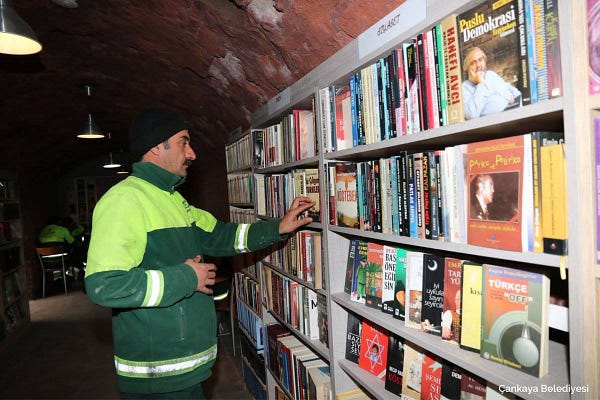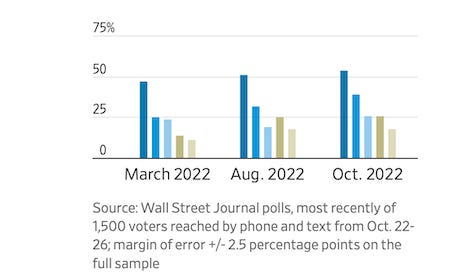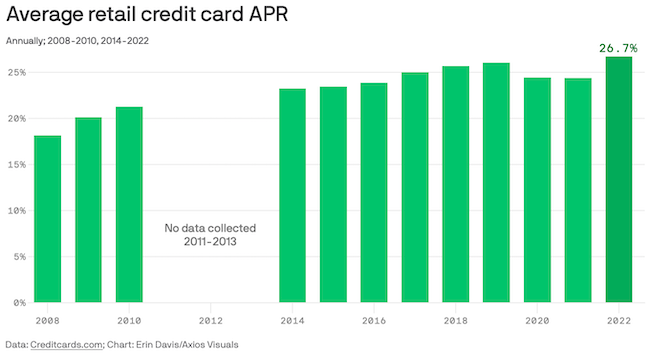Today’s posts that caught my eye:
Retail credit card interest rates hit record high: The average annual percentage rate (APR) for a retail credit card is 26.72%, an all-time high.
Tesla earns 8 times more profit than Toyota per car.
Sony to eliminate plastic packaging, starting with phones and earbuds: Electronics group eyes shift to paper and bamboo materials.
Thank you for subscribing. Know someone who should check out the newsletter? Let them!
The World
The largest US companies are preparing for a wave of congressional hearings after the midterm elections, as Republicans vow to pursue investigations into businesses’ environmental and social positions. Lawyers for financial institutions and technology companies have been training executives in recent weeks on how to respond in a televised grilling from politicians. Republican senators including Tom Cotton from Arkansas have written to law firms urging them to preserve documents related to environmental, social and governance initiatives “in anticipation” of investigations. “It used to be when Republicans took control of congress that meant that corporations could breathe a sigh of relief,” said Robert Kelner, the chair of Covington’s election and political law practice, who advises big banks and prominent companies. “That has changed.” (Financial Times)
Stocks Close Higher Ahead of Elections: The Dow rose more than 420 points to start a crowded week of corporate earnings, inflation data and midterm elections that could see a shift to Republican control of one or both chambers of Congress. (Wall Street Journal)
Inside the wild subculture of traders who bet on elections (Fast Company)
Inflation Strains Voters Across Income Levels Ahead of Midterm Elections: Lower-income Americans are feeling inflation’s impact the most, but top-earning households have become increasingly burdened. Among those with annual household incomes of more than $150,000 up to $200,000, 26% say rising prices are creating major financial strains, nearly double from the level in March. (Wall Street Journal)
US Quietly Asks Banks to Keep Some Ties With Russia, Even as Congress Balks: Treasury, State prod JPMorgan, Citi to bank some Russian firms Congress lambasted banks for continuing to do work in country. (Bloomberg)
China becomes top exporter to Russia as sanctions hit Moscow’s trade with EU: Country’s goods imports during summer months down 24% year on year, according to Kiel research. (Financial Times)
Justin Trudeau has warned that China is “play[ing] aggressive games” to undermine democratic institutions amid reports Beijing actively interfered in Canada’s federal elections. His comments came after a report that Beijing had funded a “clandestine network” of candidates in Canada’s 2019 election and just days after the federal police force said it was actively investigating a secret network of illegal Chinese “police stations” in Toronto. (The Guardian)
US says it wants to get defense talks with China ‘back on track’: White House National Security Adviser Jake Sullivan urges renewed military-to-military communication, which Beijing cut off after Nancy Pelosi’s trip to Taiwan. (South China Morning Post)
The world is on a 'highway to climate hell,' U.N. Secretary-General Antonio Guterres said, addressing the U.N. climate summit: "A window of opportunity remains open, but only a narrow shaft of light remains. The global climate fight will be won or lost in this crucial decade -- on our watch. One thing is certain: those that give up are sure to lose." (Nikkei Asia Review)
Macron backs climate cash trillions, seeking to overhaul the way climate finance flows to the countries that most need it. He called for a “huge shock of concessional financing,” suspension of debt for disaster-struck countries and putting the IMF on notice. (Politico EU)
Twitter’s blue check policy may be a blessing to Russian trolls: The new owner’s subscription policy — $8 a month for that coveted blue checkmark — doesn’t start until after the midterms, but the national security world is already crafting doomsday scenarios. The dangers are much more worrisome than some of the threats of warfare from foreign adversaries, argued Glenn Gerstell, a senior adviser at the Center for Strategic and International Studies who served as general counsel of the National Security Agency and Central Security Service from 2015 to 2020. “I’m sure that the Kremlin, Vladimir Putin and Yevgeny Prigozhin are delighted to know that for just $7.99 a month, you can sow discord and set Americans against each other,” Gerstell told NatSec Daily, referring to the Russian oligarch who admitted to interfering in U.S. elections on Monday and vowed to continue doing so. “From their point of view, that sounds like, “Wow, what a great deal. Where do we sign up?’” (Politico)
Putin ally Yevgeny Prigozhin admits interfering in US elections: Russian businessman and founder of Wagner Group says interference will continue as midterms loom. “Gentlemen, we interfered, we are interfering and we will interfere,” Prigozhin, who has previously been accused of influencing the outcome of elections across continents, said . “Carefully, precisely, surgically and the way we do it, the way we can.” (The Guardian)
Elon Musk urges his followers to vote Republican after chaotic weekend at Twitter: Musk’s endorsement of GOP candidates to his 115 million Twitter followers, a day before midterm elections, is likely to intensify the partisan divide over his takeover of the platform. (Washington Post)
The Democratic National Committee is planning to pick up a big project after the midterm election: shaking up its presidential nominating process and changing the states that get to vote early. But a potential Republican wave could suddenly limit Democrats’ options for upending the primary calendar. Sweeping legislative or statewide losses could jeopardize some state Democrats’ ability to reschedule their primaries to jump into the early-state window, like Michigan, or to compete for the first-in-the-nation primary, like Nevada. Without full or partial Democratic control of government, passing state legislation to change primary dates and overturn the existing early-state nominating lineup — the longtime quartet of Iowa, New Hampshire, Nevada and South Carolina — quickly gets more complicated. (Politico)
Some small town residents in America can’t count on clean tap water, a three-year long investigation by The Associated Press shows. Over the course of their investigation, the AP found that small water providers violated the Safe Drinking Water Act’s health standards nearly 9,000 times. The worst offenders—mostly in small, rural towns—included 450 utilities that stayed on the list for at least five of the last 10 years. Four million Americans rely on these systems, and some of them have been living without clean tap water for more than a decade. (Associated Press)
Economy
“Quiet firing” is now also a thing, according to a new study by two Michigan State University business school researchers The authors’ new research, based on a survey of ~1,000 American workers, shows a few common patterns on how companies—which may be trying to avoid legal, financial, and reputational costs—try to get their workers to quit. Among the most common signs of quiet firing: changes to work responsibilities, compensation, and communication. (HBR)
Global law firms scale back hiring as slowdown begins: Profits at some of the largest groups are shrinking because of increases in costs and decline in M&A activity. Preliminary data from the US Bureau of Labor Statistics showed the legal sector in the country lost more than 13,000 jobs in August and September, with a small rebound in October. Hundreds of job vacancies in the US legal sector were also withdrawn last month, marking the first signs of a potential slowdown. (Financial Times)
Retail mortgage originations dropped 90% year-over-year at Wells Fargo, which is now reportedly contemplating layoffs. Online lenders and proptech startups are facing similar pain. (Protocol)
UK house prices suffered their biggest monthly drop for almost two years in October, with the fall largely brought on by the mini-budget and the “significant shock” it caused the property market. House prices fell by 0.4 per cent last month, the steepest fall since February 2021. (The Times)
The US Northeast Is Hurtling Toward a Winter Heating Crisis: Heating oil delivered to New York is the priciest ever. Retailers in Connecticut are rationing it to prevent panic buying. New England’s stockpiles of diesel and heating oil — the same product, taxed differently — are a third of normal levels. Natural gas inventories are also below average. (Bloomberg)
Moving In Together Doesn’t Match the Financial Benefits of Marriage: As of 2019, the median net worth for cohabiting couples age 25 to 34 was $17,372, a quarter that of the $68,210 for married couples of that same age range, according to data from the Federal Reserve Bank of St. Louis. For singles it is $7,341. (Wall Street Journal)
Retail credit card interest rates hit record high: The average annual percentage rate (APR) for a retail credit card is 26.72%, an all-time high. The average general-purpose credit card APR is 22.66%. 11 cards have maximum APRs of 30.74%, including Speedy Rewards Mastercard and Kroger Rewards World Elite Mastercard. (Axios)
Technology
Tesla earned eight times as much profit per vehicle as Toyota Motor in the July-September quarter despite being outsold more than 7 to 1, a Nikkei analysis shows, putting the American electric-vehicle maker ahead in quarterly net profit for the first time since going public in 2010. (Nikkei Asia Review)
MIT have come up with a way to improve the energy density of these nonrechargeable, or “primary,” batteries. They say it could enable up to a 50 percent increase in useful lifetime, or a corresponding decrease in size and weight for a given amount of power or energy capacity, while also improving safety, with little or no increase in cost. (MIT News)
In a partnership no one saw coming, AMC is working with Zoom to turn some theaters into giant meeting rooms. The theater chain will even provide “food and beverage offerings, possible movie viewings, and concierge-style personalized handling of meeting needs. While the unlikely pairing of a pandemic-era darling and a meme stock is more about the PR splash than either company’s bottom line, initial takes say that the idea is not entirely preposterous. (The Verge)
Sony to eliminate plastic packaging, starting with phones and earbuds: Electronics group eyes shift to paper and bamboo materials. (Nikkei Asia Review)
Mastodon Struggles to Keep Up With Flood of Twitter Defectors: Founder and CEO says he’s working around the clock on site Mastodon now has more than 1 million monthly active users. (Bloomberg)
Twitter tells advertisers that user growth is at ‘all-time highs’ under Elon Musk. (The Verge)
Smart Links
This job pays $60,000 – or maybe $150,000: companies skirt New York salary law. (The Guardian)
Europe’s Energy Crunch Will Trigger Years of Shortages and Blackouts. (Bloomberg)
Japan shelves carbon tax as energy prices soar. (Nikkei Asia Review)
From Teslas to BMWs, cars are piling up on land and at sea in German port of Bremerhaven. (CNBC)
Liverpool FC sale explored by US owners Fenway Sports Group. (Financial Times)
SATs fly out of UPS truck after exams, Texas high school seniors may have to retake tests. (District Administration)
A total lunar eclipse is happening Tuesday — and it won't happen again for 3 years. (NPR)
'Mattress Mack' wins historic $75M payout off Astros' title (ESPN)
Good News
In Turkey, a group of garbage collectors started collecting books that people would throw away. Before long, they had so many books that they were able to open a library. (Goodable)




Delaware woman wins six-figure lottery prizes twice in one week. (Washington Post)


Thank you for subscribing to my newsletter. Know someone you think would like it?




